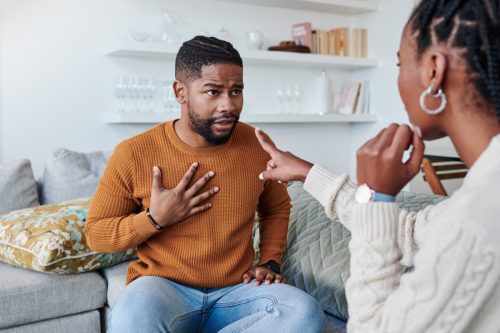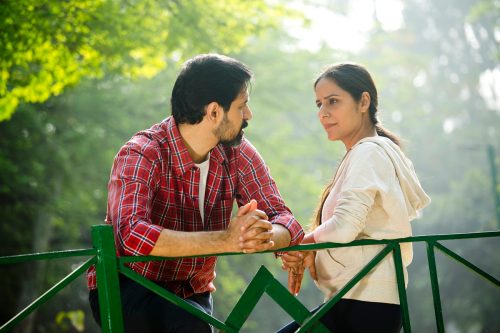The Worst Myers-Briggs Types to Marry

There are different components of a successful relationship, which range from shared life views to being able to amicably decide which Netflix series to watch. If you’re thinking about taking the “next step” and getting married, these factors become even more important. Your partner’s personality is obviously something you’re familiar with, but if they have a certain type—per the Myers-Briggs Type Indicator (MBTI)—they may not necessarily be marriage material.
The MBTI is comprised of four different dichotomies. According to the theory, you either lean more towards Extroversion (E) or Introversion (I); use Sensing (S) or Intuition (N) when absorbing information; are more Thinking (T) or Feeling (F) when making decisions; and are either more Judging (J) or Perceiving (P) when it comes to the world around you. These letters are arranged to form 16 different four-letter acronyms that can be used to define your personality.
The MBTI is subjective, and according to Nereida Gonzalez-Berrios, MD, certified psychiatrist of ThePleasantPersonality, it would be harsh to call any personality type the worst to date or marry, as all 16 types bring unique strengths and weaknesses to a relationship. For example, some partners are open and flexible and able to “adjust” to different personality types, she says. But on the flip side, certain Myers-Briggs types don’t jibe with a larger number of others. Read on to find out which four Myers-Briggs personality types might be troublesome when it comes to matrimony.
READ THIS NEXT: The Best Myers-Briggs Type to Marry, Experts Say.
INTJ

Those who are introverted, intuitive, thinking, and judging could be problematic in a marriage. People with this personality type tend to be rigid and less open-minded, which can cause these “logical masterminds” to struggle in relationships, Gonzalez-Berrios says.
“They see life as black and white and nothing in between,” she says. “These individuals will have a tough time dealing with the sensing-perceiving personalities who are more flexible, adaptable, lively, and spontaneous. INTJs approach their relationship with the same level of seriousness as they would approach any other challenges in their daily life.”
According to Gonzalez-Berrios, this may manifest in the way they treat their partner, meaning they can be firm and rude. They’re also likely to be nitpicky and strive for perfection, setting high standards for their partners “which many Myers-Briggs types will not be able to fulfill.”
Because these types are both introverted and intuitive (their dominant function), they can lack compassion and “prefer partners who are just like them.” Therefore, Gonzalez-Berrios suggests that INTJs fare the best in relationships with other INTJs or other introverted types who are also thinking and intuitive. Being introverted and feeling (their “tertiary” function) also makes it difficult for them to connect emotionally and understand a partner’s needs without being explicitly told—which can be problematic in a marriage,
The partners that INTJs are likely to butt heads with are ISFPs, ESFPs, ISFJs, and ESFJs, per Gonzalez-Berrios.
INTP

INTPs are also on shaky ground when it comes to marriage, but they do believe in committed relationships, Gonzalez-Berrios says.
“They want partners who will give them freedom to think, ponder, and use their gut feelings to make important life choices,” she explains. “INTPs are not keen to feel trapped in the duties of married life.”
Instead, people with this personality type want independence to make decisions and “choose everything in their personal relationships.” This will be particularly problematic if they are dealing with more sensing-judging types who prefer organization, she adds, and INTPs are not interested in “altering their ways of living.”
“INTPs want partners who have the ability to explore theories and abstract ideas. Anyone who does not possess the quality of initiating and maintaining deep conversations, and thinks logically, cannot become their partner,” Gonzalez-Berrios says.
Additionally, these types can be “choosy” in general and want the freedom to “rejuvenate and unwind” by themselves, away from work and family, which can be difficult in a relationship.
For INTPs, their “contrasting partners” are ISFJs, ESTJs, ESFJs, and ESFPs.
For more relationship advice delivered straight to your inbox, sign up for our daily newsletter.
ENTP

The only extroverts to make the list are those who are also intuitive, thinking, and perceiving. They aren’t looking for partners who want to casually date, and can be “quite serious with their relationships,” Gonzalez-Berrios explains. This will cause friction with sensing-feeling types, who “cannot blend with the ENTP values and motivations in marriage and intimacy,” she says.
“ENTPs prefer intellectual connection with their partners,” Gonzalez-Berrios tells Best Life. “They are less emotional and find it hard to understand subtleties in people’s emotional world.”
Those with this personality type tend to be relaxed but thoughtful and won’t respond well to partners who place more value on rules or “social niceties” in life.
These types also want to have the last word in a relationship—thanks to their perceiving nature—and won’t work well with sensing-feeling-judging personalities “unless they make certain adjustments to accommodate the needs of their contrasting partners,” Gonzalez-Berrios says.
For ENTPs, their contrasting partners include ISFJs, ISTJs, ESFJs, and ISFPs.
ISTJ

Rounding out the list are ISTJs, who are both traditional and organized. They have a rational approach to life, but their tendency to be more reserved can present problems.
“They cannot relate well with partners who are too outgoing, relaxed, and emotional in nature,” Gonzalez-Berrios explains. They’re introverts and have an “organized inner world that is methodical, planned, and thoughtful.”
They won’t want to rush a decision and will likely want to take a relationship slowly, she says, “testing” potential partners before officially settling down.
“Being a sensor, they will find it hard to communicate freely with typical intuitive-thinking types,” she says. “Moreover, their feeling function is not well developed, so it makes ISTJs appear cold and insensitive in relationships.”
Their partners can then take this as an ISTJ being “cold and affectless,” making it hard to feel confident when stating your vows. These traits will be particularly problematic with intuitive-feeling-perceiving types, Gonzalez-Berrios states.
ISTJs’ contrasting partners include ENFPs, ENTPs, INFPs, and ENFJs.